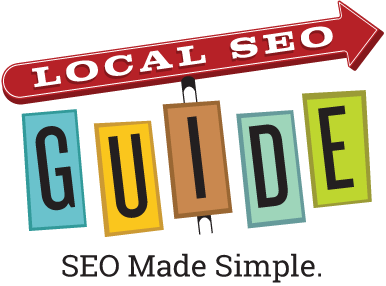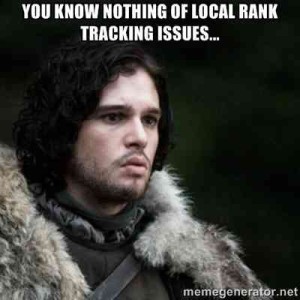I am publishing part of this post that just went live on SearchEngineLand because:
1. The original title was “Why Local Rank Trackers Suck”. I get why SEL rewrote it as “Why Local Rank Trackers Fail” – it’s a family site after all – but I think you’ll agree “Suck” is much more accurate.
2. The editors changed the top image I provided to a stock photo. While I think the article works fine without the image, it’s the image that would have caught people’s attention. I mean who wants to read about local rank tracking, especially with stock images? But everyone likes a good Jon Snow meme. I am guessing the issue had to do with copyright stuff and not wanting it to show on SEL’s homepage. So instead the inserted it further down where it’s referenced in the piece.
3. I’ve got nothing better to do with my time than assert my editorial voice about something that no one will remember in a week. Happy MLK Day!
Hey, rank trackers! You know I love you guys, but let’s face it — your local rank tracking is a fail. This Twitter thread says it all.
I’ve got nothing against any of you, but I am hoping this rant will spur some of you on to solve this problem. Hey, maybe you already have, and I just don’t know about it. Hit me up, and I’ll get SEL to cross this whole thing out and put a nice juicy link to your site at the top with anchor text = “best local rank tracking software.” (Editor’s note: This is not going to happen.)
For local search marketers — and if you have been following the evolution of mobile search, you know we are all on our way to becoming local search marketers — rank tracking can be helpful to both understanding the SERP landscape and communicating with clients. (I know, no one wants to report rankings to clients, but they all still seem to want them.)
There are a ton of Local Rank Trackers — our list of Local SEO Tools has 23 — but the process has become increasingly difficult as Google iterates on their technology.
The Problem(s) With Location-Based Tracking
Google likes to return local pack/maps results based on the user’s physical location; however, there is often a lot of wiggle room. Google always thinks I am one city over, for example.
On top of that, local organic results are not always driven by precise location targeting on GOOG’s end. So before we even start tracking, the data is a bit fuzzy. Par for the course in Local.
Now consider that these tools are generally designed to track rankings in markets where a business is physically located. This presents a huge problem for service area businesses that may be attracting customers from dozens of cities. How about a business where customers will travel greater distances (like to get a great deal on the exact car they want)?
These businesses generally have to pay a significant amount of money for enough credits to cover all of their “markets,” and then they usually have to track all these areas as separate locations. That means a single plumber may need several “locations” in a rank tracker just to properly track search results in their target markets.
Now imagine how this works when you have 1,000 locations. On second thought, let’s not.
What Do You Mean When You Say “Local Rankings?”
When you say “local rankings,” do you mean local organic rankings, or are you talking about local pack rankings?
Or maybe you mean Google Maps? And what about Apple Maps? How do you factor one-boxes, local Knowledge Graph results and combined local/organic results into you tracking? Oh yeah, and let’s not forget about mobile SERPs and app indexing. And how do you report this mess?
Tracking Frequency Vs. Ranking Volatility
We all know that search rankings are incredibly volatile, so how do you separate the signal from the noise?
Some rank trackers track daily, because they want you to have a complete data picture, but that includes a lot of noise that is difficult to sort out. This is especially true of multi-location brands where daily tracking across hundreds (or thousands) of locations becomes an impenetrable abyss of “big data” that needs significant analytical skill and time to sort out.
If you try to cut through the noise by using weekly tracking, then you are only looking at a slice of the whole picture that may omit important movement based on days of the week.
It’s basically a given at this point that user behavior influences search rankings, so your business vertical may be specifically prone to these fluctuations; that’s another variable that drives your average multi-location brand analytics guy to break bad.



No Comment